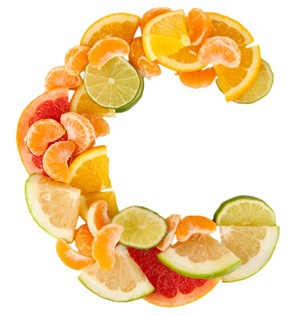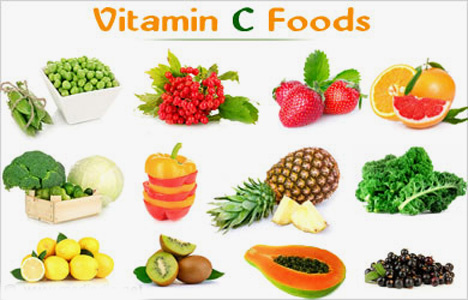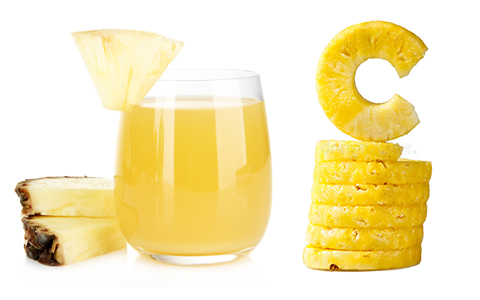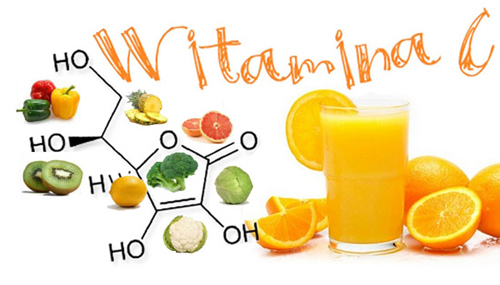What is vitamin c good for?
Vitamin C is an essential nutrients in primates and a few other creatures.
It is an antioxidant that can protect human body from free radicals. Vitamin C is also a kind of coenzyme, which exists in various fruits and vegetables.

Vitamin C benefits are the following:
Role in the hydroxylation reaction
- Hydroxylation is an essential process for the synthesis of many important substances in human body, which needs vitamin C to involve.
- Promote collagen synthesis. Lack of vitamin C will paralyze the synthesis of collagen and cause scurvy.
- Promote the synthesis of neurotransmitter (5-hydroxytryptamine and noradrenalin).
- Promote the hydroxylation of steroid. Hypercholesterolemia need more vitamin C supplement.
- Increase the activity of mixed-function oxidize, so as to promote the detoxication of medicines or toxicant.
Role in the redox process
- Vitamin C can be oxidized form and reduced form in human body, so it can serve as hydrogen donor and acceptor.
- Promote antibody formation. High concentration of vitamin C can reduce cystine in food protein, and promote the systhesis of antibody.
- Promote the absorption of iron. Vitamin C can reduce ferric iron into ferrous that easy to absorb. It can keep ferrous complexase in active status and play an effective role. So vitamin C is regarded as an important ancillary drug for the treatment of anemia.
- Promote the formation of tetrahydrofolic acid. Vitamin C can reduce folic acid into tetrahydrofolic acid with therapeutic effect on megaloblastic anemia.
Other effects
- Detoxication. Large quantity of vitamin C supplement can reduce the toxicity of lead, mercury cadmium, and arsenic to human body.
- Keep the tumors at bay. Vitamin C will stop the synthesis of cancerogen N – nitroso so as to prevent cancer.
- Scavenging free radical. Vitamin C can clear away superoxide ions, hydroxyl radicals, organic radicals, and organic peroxy groups, reduce tocopherol free radical to tocopherol, and reduce ascorbic free radical to ascorbic acid.
vitamin c fruits and vegetables

Human body cannot generate vitamin C. The main food source of vitamin C is fresh vegetables and fruits.
- Fruits containing the highest quantity of vitamin C are dates, fresh dates, strawberries, oranges, lemons, etc.
- In vegetables, the best vitamin C sources are pepper, garland chrysanthemum, bitter melon, beans, spinach, potatoes, leeks etc.
- Besides, animals’ guts also contains a small amount of vitamin C.
The table below shows top 20 food with the highest Vitamin C content.
| Rank | Food | VC content mg/100g |
|---|---|---|
| 1 | fresh dates | 243 |
| 2 | red pepper | 144 |
| 3 | candied date | 104 |
| 4 | dehydrated garlic | 79 |
| 5 | White radish sprouts | 77 |
| 6 | tsatsai | 76 |
| 7 | leaf mustard | 72 |
| 8 | green pepper | 72 |
| 9 | guava | 68 |
| 10 | oilseed rape Moss | 65 |
| 11 | Kiwi fruit | 62 |
| 12 | green red pepper | 62 |
| 13 | broccoli | 61 |
| 14 | red brassica campestris | 57 |
| 15 | brussels sprouts | 57 |
| 16 | bitter gourd | 56 |
| 17 | rapeseed core | 54 |
| 18 | hawthorn | 53 |
| 19 | watercress | 52 |
| 20 | cabbage | 51 |
Vitamin C content in fruit juice
Fruits play an important role in supplement vitamin C. The acidity of fruits can keep the vitamin C stable. We can take in vitamin C more efficiently by eating fruits directly. As the vitamin C in fruits will decrease with time, we’d better eat them as soon as possible. If we buy them in advance, we can preserve them at low temperature, and peel or cut them when we decide to eat. In this way we can reduce the loss of vitamin C.
Many people eat fruits or drink fruit juice with the purpose of supplement vitamin C. How much vitamin C in fruits can be seen as high? Usually, if a fruit (around 150g) can contains over 30mg vitamin C, it can be seen as fruits high in vitamin C.
Fruits high in vitamin C
The most common fruits high in vitamin C are Guava, kiwi, papaya, strawberries, oranges, lemons, and pineapples. The following table compares the VC content in some common fruit. The VC content is not positively correlated with the acidity of the fruits.
| Fruits | VC content |
|---|---|
| Psidium guajave | 342mg |
| Kiwi fruit | 139mh |
| Pawpaw | 93mg |
| Grapefruit | 89mg |
| Strawberry | 88mg |
| Orange | 80mg |
| Lemon | 80mg |
| Pineapple | 54mg |
| Apple | 6mg |
Does pineapple juice have vitamin C?
Certainly. Most fruits contains vitamin C, but the contents are different. Pineapple contains abundant vitamin C, which is 5-10 times that of pears and apples, so it is known as an ideal fruits for obtaining vitamins.
Besides, fresh pineapple contains water as high as 85%, and sugar, protein, fat, vitamin A, B, bromelaine, calcium, phosphorus, iron, organic acids, niacin. The pineapple proteinase can promote proteolysis.

Benefits of drinking pineapple juice
Pineapple juice has outstanding health care effect. The bromelain contained in pineapple can resolve proteins, the blood clot and fibrous protein blocking the tissues, promote the digestion of meat and greasy food prevent the forming of thrombus, and improve blood circulation. The sugar, salt, and enzyme in pineapples have the efficacy of diuretic, detumescence. Pineapple juice has therapeutic effect on Nephritis, edema, cough, and profuse sputum. The protease and dietary fiber can help digestion, and bring away extra fats in intestinal, which can prevent and relive constipation.
Vitamin C in orange juice
According to scientific experiment, every 100g fresh orange juice contains about 37.5 mg vitamin C. The benefits of orange juice are the following:
- The vitamin C and carotene can build up resistance, expel harmful lipid soluble substances, prevent scurvy and cancer, soften blood vessel, promote blood circulation.
- The flavonoids and citonin in orange juice can help HDL (high density lipoprotein) transmit LDL (low density lipoprotein) out of human body. As a research proves, drinking orange juice everyday can increase the content of HDL in human body, and reduce the risk of heart disease. Other citrus fruit juice also have similar functions.
- The fructose in orange juice can replenish strength quickly. And the 85% water content can quench thirst and refresh spirit. It is more effective to add some salt.

Vitamin C loss in orange juice
Fresh orange juice has high nutritive value and taste, but it have to be drunk right after extraction. Vitamin C is unstable, easy to lose in open air.
It is said that the vitamin C in orange juice will lose completely after a half hour in open air. Nutritionists says there is no exact rate at which vitamin C is lost in fresh juice, but vitamin C is quite a unstable nutrients. It will get destroyed as soon as it connects with the air.
Vitamin C loss not only takes place in fresh orange juice, but also bottled juice. The package can prevent the air contact, but once you open the bottle, the nutrition loss begins. So, it is recommend to drink up the orange juice within a short time once you have opened the seal.

-lp.jpg)

